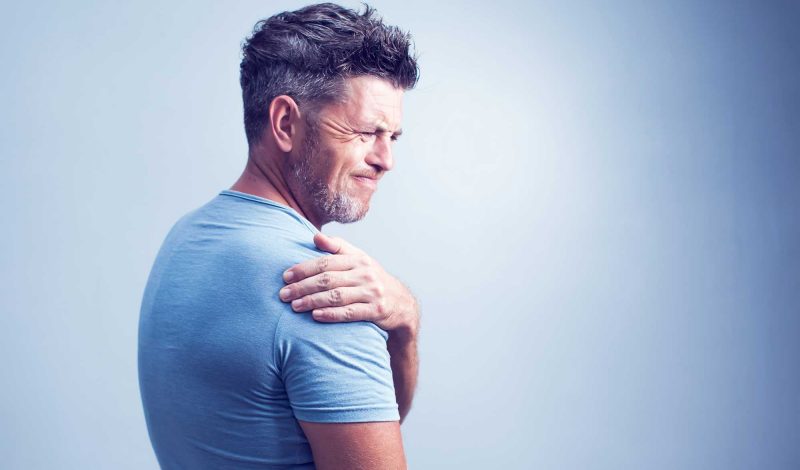Severe arm pain?…could it be calcific tendinitis?
Jonathan Wride – Specialist physiotherapist in Cheltenham writes about calcific tendinitis.
Calcific tendinitis is one of the most over looked causes of severe arm pain that I commonly see in clinic in Cheltenham. In fact 4 separate cases this week has inspired a blog on this very painful shoulder injury.
The typical story behind calcific tendinitis is when a patient describes waking up one day with agonising arm pain (literally 10/10 pain!) for absolutely no reason whatsoever. No injury or any trauma – just waking up one day and not being able to move their arm!
Obviously this is a frightening experience and most people will go to accident and emergency where an X-ray is taken, only to be told there is nothing to be found! But how can there be so much pain and nothing found?
Well the reason for the pain is actually calcification. Yes calcium, the same material that makes up your bones can grow into the tendons of the shoulder. The most common tendon affected is the Supraspinatus tendon (80%) followed by the Subscapularis and Infraspinatus tendons.
However during calcific tendinitis the calcium does not look like bone but in fact it is soft like toothpaste (see the picture below to see what the calcium looks like).
So what is the best scan to diagnose calcific tendinitis? Well Ultrasound scans have been shown to have the most accurate diagnostic ability for this condition even beating that of an MRI scan! The advantage of ultrasound scans is they are performed dynamically so you can actually see inflammation in real-time. Have a look at some ultrasound images below to see what calcium looks like on a scan.
Women are more likely to suffer from this condition, however, it can also affect men. It typically effects patient’s aged between 30-60 years and is linked to diabetes, hypothyroidism, gallstones and gout.
There are 3 stages to this condition:
Stage 1: Calcific stage: This is when calcific deposits begin to develop and you may not even be aware, as it is not a painful process.
Stage 2: Resorptive Stage: During this stage the body is actively reabsorbing the calcium. It is this stage that is very painful.
Stage 3: Post-calcific Stage: This is when the tendon returns to normal and is not normally a painful stage, although some discomfort can remain.
The good news is that there are some very effective solutions for this condition depending on which stage of the condition you have.
If you are at the start of stage 1 then typically you will not be in great deal of pain. At this stage you should try to manage the pain with reducing shoulder activities and trying a short course of anti-inflammatory medication.
If your pain is at a high level then you will need to start with an ultrasound scan in order to accurately diagnose the size of the calcification and the stage of the condition. It is at this stage that an ultrasound guided corticosteroid injection expertly placed around the area of calcification can dramatically reduce pain in as little as 7 days. Once the pain is under control then physiotherapy exercises can be started to regain shoulder movements. Most patients only require one injection – however sometimes if symptoms come back a second injection can be safely performed.
Once the painful stage is over a number of patients can be left with a slightly painful shoulder on certain movements of the shoulder. This can stop higher-level activities such as gym exercises and sports. If this is the case, then shockwave therapy is an excellent treatment option. Shockwave therapy uses high-powered sound waves to encourage the resorption of calcium and return the shoulder to normal. Most people will feel marked improvements after just 3 shockwave treatments.
So, as always my advice with shoulder pain is to start your road to recovery with an accurate diagnosis. If you have been struggling with shoulder pain, then email Skelian Chiropractic Clinic at stpauls@skelian.co.uk for details on getting an ultrasound scan in Cheltenham.
Alternatively, you can call Skelian Chiroractic Clinic Cheltenham on 01242 25400.
References
https://www.ncbi.nlm.nih.gov/pmc/articles/PMC4716572/
https://www.ncbi.nlm.nih.gov/pmc/articles/PMC6209365/
https://www.ncbi.nlm.nih.gov/pmc/articles/PMC3749672/
https://www.ncbi.nlm.nih.gov/pubmed/24733195
https://www.ncbi.nlm.nih.gov/pubmed/12750138
https://www.ncbi.nlm.nih.gov/pubmed/16649891
Links
https://www.instagram.com/skelian_chiropractic/
https://www.facebook.com/skelianclinic/
https://www.youtube.com/channel/UCCJ9BXYUAAfOie7zTUUeIKA/videos



